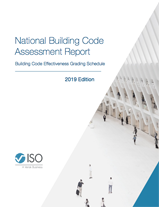Building Code Effectiveness Grading Schedule (BCEGS®)
Our Building Code Effectiveness Grading Schedule (BCEGS®) assesses community building codes and their enforcement, with special emphasis on mitigation of losses from natural hazards.
 Christopher Miller
Christopher Miller
Senior Technical Coordinator – BCEGS
Community Hazard Mitigation
cmiller@verisk.com
Municipalities with well-enforced, up-to-date codes should demonstrate better loss experience, which can be reflected in lower insurance rates. The prospect of lessening catastrophe-related damage and ultimately lowering insurance costs provide an incentive for communities to enforce their building codes rigorously — especially as they relate to windstorm and earthquake damage.
The anticipated benefits are safer buildings, less damage, and lower insured losses from catastrophes. The BCEGS program assesses a community’s building code enforcement in three areas:
- Code administration
- Plan review
- Field inspection
We collect 1,243 data points to calculate two scores: One for one- and two-family residential construction and another for commercial or industrial construction. Internal scoring ranges from a minimum of 0 to a maximum of 100. For insurance rating guidance, we translate the scores to a scaled class rating of 1 (exemplary commitment to building code enforcement) to 10. The classifications apply to communities under the jurisdiction of each building code department. We provide participating insurers with BCEGS classifications, BCEGS advisory credits, and related underwriting information.
How this website can help you
Follow the links for further information about the BCEGS program:
- BCEGS Classifications and Survey Process
- BCEGS Usage and Applicability
- State Average BCEGS Classifications
BCEGS Questionnaire
Download the BCEGS Questionnaire and the Employee Data Sheet, which you need to submit for each building code enforcement employee.
For more information on any topic related to the Building Code Effectiveness Grading Schedule (BCEGS®) program, contact our mitigation team via email at BCEGS_info@verisk.com or call our mitigation specialists at 1-800-444-4554.

